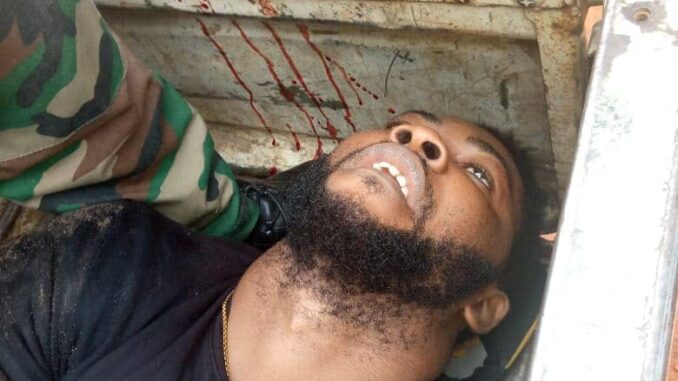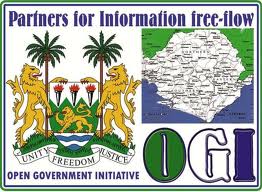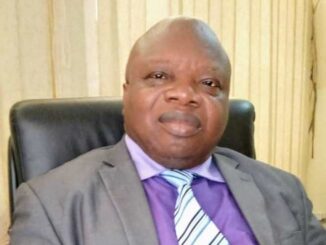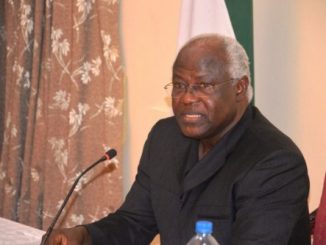
Sierra Leone at a Turning Point: Human Rights Abuses and the Urgent Need for ECOWAS Intervention
Introduction
Sierra Leone stands at a pivotal crossroads, faced with a choice that will define its future: reclaim its destiny as a land of hope, prosperity, and democratic values, or continue on the perilous path towards authoritarianism and civil unrest. The 2023 presidential election did more than expose weaknesses in the electoral system—it revealed the extent of the human rights abuses and political repression that have plagued the nation under President Julius Maada Bio since he took office in 2018. Under Bio’s regime, Sierra Leone has experienced a troubling decline in civil liberties, the rule of law, and democratic freedoms, threatening the nation’s hard-earned progress and its aspirations for a brighter future.
The  stakes for Sierra Leone could not be higher. The people are at a historic juncture where they must choose between accepting the status quo or seizing the opportunity to reinvent their country as a beacon of justice, human rights, and democratic governance. It is a moment for national reinvention—a chance for Sierra Leone to reemerge as a symbol of resilience, determination, and a commitment to the principles of freedom, justice, and accountability.
stakes for Sierra Leone could not be higher. The people are at a historic juncture where they must choose between accepting the status quo or seizing the opportunity to reinvent their country as a beacon of justice, human rights, and democratic governance. It is a moment for national reinvention—a chance for Sierra Leone to reemerge as a symbol of resilience, determination, and a commitment to the principles of freedom, justice, and accountability.
However, this reinvention cannot happen in isolation. International attention, particularly from the Economic Community of West African States (ECOWAS), is essential to help Sierra Leone chart a course toward peace, stability, and democracy. The flagrant abuses of human rights, coupled with widespread electoral fraud and political intimidation during the 2023 election, highlight the urgent need for ECOWAS and the international community to step in.
The election of 2023 stands as a watershed moment—an election marred by fraud, violence, and suppression of political opposition, where the people’s voice was drowned out by state-sponsored intimidation. This moment in Sierra Leone’s history demands action, not only to hold those responsible accountable but also to ensure that such violations never happen again. For President Maada Bio, this means facing prosecution at the International Criminal Court (ICC) for his role in orchestrating human rights abuses, manipulating electoral outcomes, and stifling opposition voices.
A Troubling Legacy of Human Rights Violations
President Maada Bio ascended to power with promises of reform, accountability, and a commitment to democracy. However, these hopes were quickly dashed as his administration became synonymous with repression and human rights abuses. Throughout Bio’s first term, the government repeatedly employed heavy-handed tactics to silence political opposition, leading to grave violations such as:
Extrajudicial Killings and Police Brutality:
Sierra Leonean security forces, often acting with impunity, have violently suppressed peaceful protests, targeting opposition supporters and activists. High-profile incidents, including the massacres at Pademba Road Prison and violent crackdowns in Makeni and Lunsar, left numerous civilians dead. These state-sanctioned killings not only violate the fundamental right to life but signal a deep disregard for the rule of law.
Arbitrary Arrests and Detentions:
Political opponents, civil society leaders, and journalists have been systematically targeted, enduring arbitrary arrests and prolonged detentions. Figures such as Evangelist Samson, who spoke out against government abuses, were silenced through state violence, in some cases paying the ultimate price with their lives.
Suppression of Free Press:
Independent media in Sierra Leone has been under relentless attack. Journalists, bloggers, and social media activists critical of the government have been harassed, detained, or forced into exile. The murders of activists like Wilson Kay and Nurse Mahawa further underscore the peril of dissent under Bio’s regime.
Erosion of Democratic Institutions:
The Bio administration has also systematically undermined democratic institutions, using state resources to consolidate power and marginalize opposition voices. Elections, including the 2023 presidential race, have been marked by widespread fraud, voter intimidation, and manipulation—further eroding public trust in democracy.
The Post-2023 Election Crisis: A Time for Action
The aftermath of the contested 2023 election has exacerbated Sierra Leone’s human rights crisis. As opposition APC leader Dr. Samura Kamara and his supporters challenged the election results, the Bio government responded with a campaign of political repression. Reports of targeted violence against opposition members, arbitrary detentions, and media blackouts point to an increasingly authoritarian state.
This moment of political crisis marks a turning point for Sierra Leone. It is a time when the nation can no longer afford to wait for change to come from within, as the Bio regime tightens its grip on power. The escalating violence and unrest call for urgent international intervention, and ECOWAS (Economic Community of West African States) must step forward as a key actor in restoring peace and democratic integrity in Sierra Leone.
A Call for ECOWAS Intervention
ECOWAS has long stood as a guardian of democracy and stability in West Africa. Its intervention in Sierra Leone is now crucial to prevent the country from slipping further into political chaos and potential civil conflict. Under the leadership of Chairman Bola Ahmed Tinubu, ECOWAS has an opportunity to uphold its mandate to safeguard democratic values, human rights, and regional stability.
This intervention would serve three key purposes:
Protecting Civilians from State-Sanctioned Violence:
ECOWAS must deploy peacekeeping forces to safeguard civilians from further brutality at the hands of Sierra Leonean security forces. The violence against peaceful protesters and opposition members must be halted, and ECOWAS forces can ensure that this protection is upheld.
Restoring Democratic Integrity:
The legitimacy of the 2023 presidential election has been called into serious question, with significant allegations of fraud and intimidation. ECOWAS must help ensure that any future political transitions reflect the true will of the people. Its intervention will be key in facilitating free and fair elections moving forward.
Holding Human Rights Violators Accountable:
Those responsible for human rights abuses under President Bio’s regime must be brought to justice. ECOWAS can play an essential role in supporting international efforts to investigate these atrocities and hold perpetrators accountable.
Reinventing Sierra Leone: A Land of Hope, Prosperity, and Democratic Values
Sierra Leone stands at a critical juncture—one where the country can either continue down a perilous path of political repression and human rights abuses or seize the opportunity for renewal. This moment in history offers Sierra Leone the chance to rise above its current crisis, to rebuild itself stronger, more united, and more resilient than ever before. The path forward, however, requires the active support of both domestic reformers and the international community, particularly through the intervention of the Economic Community of West African States (ECOWAS).
With ECOWAS support, Sierra Leone can embark on a comprehensive process of national renewal, one anchored in justice, transparency, inclusion, and accountability. The nation has the potential to become a beacon of democratic revival in West Africa, demonstrating to the world that even in the face of profound adversity, a country can rise to reclaim its future. This is not merely a crisis; it is a historic opportunity for Sierra Leone to reinvent itself and reassert the values of democracy, human rights, and the rule of law.
A Historic Turning Point for Sierra Leone
Sierra Leone’s current predicament is rooted in a broader crisis of governance under President Julius Maada Bio, whose administration has been marked by increasing authoritarianism, electoral fraud, and systemic human rights violations. The 2023 presidential election, marred by fraud, voter suppression, and political intimidation, stands as a stark reminder of how far the country has strayed from its democratic ideals. However, this very moment also presents a rare and critical chance for the people of Sierra Leone to take control of their future, to rewrite their national narrative, and to establish their country as a land of hope, opportunity, and democratic values.
The resilience of Sierra Leone’s people has been tested before, through the devastation of civil war and the challenges of the Ebola epidemic. Now, as the nation stands at the edge of further instability, the people must be given the opportunity to shape a future that reflects their aspirations for peace, prosperity, and dignity. But this transformation will not occur without concerted effort—both internally, through grassroots mobilization and democratic reforms, and externally, through decisive international intervention to hold the current regime accountable.
The Role of ECOWAS: A Catalyst for Democratic Renewal
The Economic Community of West African States (ECOWAS) has long served as a regional guardian of democratic principles and stability. It has the capacity to act as a catalyst for Sierra Leone’s democratic renewal, bringing together regional partners to support the restoration of democracy and the protection of human rights. ECOWAS intervention would provide the necessary pressure on President Bio’s regime, signaling that West Africa will not tolerate electoral fraud, human rights abuses, and the erosion of democratic norms.
ECOWAS, through diplomatic engagement and, if necessary, peacekeeping deployment, must ensure that the democratic will of the Sierra Leonean people is respected. The regional body can provide the framework for holding new, free, and fair elections, thereby restoring faith in the electoral process. Furthermore, ECOWAS can help establish mechanisms for accountability, ensuring that those responsible for electoral fraud and human rights violations, including President Maada Bio, face justice for their actions.
The Need for International Accountability
One of the most crucial steps in Sierra Leone’s renewal is the prosecution of President Maada Bio at the International Criminal Court (ICC) for the widespread abuses perpetrated under his administration. His role in orchestrating electoral fraud, suppressing political opposition, and violating fundamental human rights must not go unpunished. The ICC serves as the appropriate legal body to investigate and prosecute Bio for crimes against humanity, offering a pathway toward justice for the countless victims of his regime.
Accountability at this level is not merely punitive—it is essential for restoring Sierra Leone’s faith in democratic governance and the rule of law. Without justice, any efforts at rebuilding or reform will be incomplete. The prosecution of Bio will serve as a deterrent for future leaders, reinforcing the message that political power cannot be gained or maintained through violence, intimidation, or deceit.
A Vision for the Future: Justice, Prosperity, and Inclusion
The reinvention of Sierra Leone must be built on a foundation of justice, prosperity, and inclusion. Justice will be achieved by holding accountable those responsible for undermining the democratic process and violating human rights. Prosperity will come from creating an economic environment where all citizens, regardless of political affiliation or background, have the opportunity to thrive. Inclusion means ensuring that all voices, particularly those who have been marginalized or silenced, are heard and respected in the political process.
Sierra Leone’s Vision 2030, which envisions a future of sustainable development and democratic governance, can only be realized through these foundational pillars. Justice, prosperity, and inclusion must guide every aspect of the nation’s renewal, from political reform to economic policy. The future of Sierra Leone depends not just on rebuilding its institutions but on reimagining its very identity as a nation committed to upholding human dignity, protecting civil liberties, and fostering equitable growth.
Empowering Civil Society and Democratic Institutions
Key to Sierra Leone’s transformation is the empowerment of civil society and the strengthening of its democratic institutions. Civil society organizations play a vital role in holding the government accountable, advocating for human rights, and providing a platform for the voices of ordinary citizens. For too long, civil society in Sierra Leone has been constrained by state-sponsored violence and repression, limiting its ability to drive meaningful change. Now is the time for these organizations to rise to the occasion, supported by both domestic reformers and international allies.
Additionally, democratic institutions—including the judiciary, electoral commission, and parliament—must be strengthened to function independently and without political interference. These institutions serve as the backbone of a healthy democracy, and their ability to operate freely will determine the success of Sierra Leone’s democratic renewal. Reforms aimed at depoliticizing these institutions, ensuring transparency, and enhancing their capacity to safeguard the rule of law are critical to the nation’s future stability.
A Future of Hope and Democratic Resilience
Sierra Leone stands at a defining moment, one that will determine whether it succumbs to authoritarianism and unrest or rises as a beacon of democratic resilience in West Africa. The current crisis, marked by electoral fraud and human rights abuses under President Maada Bio, cannot be allowed to persist. The people of Sierra Leone deserve the chance to reclaim their country, to rebuild it on the principles of justice, human rights, and democratic governance.
With ECOWAS intervention, supported by the broader international community, Sierra Leone can begin the process of national reinvention. By holding President Bio accountable at the International Criminal Court and creating an environment of transparency and inclusion, Sierra Leone has the opportunity to once again emerge as a land of hope, prosperity, and democratic values. The resilience of its people, combined with the commitment of its international allies, will ensure that Sierra Leone’s future is not one of despair, but one of promise and possibility.
This moment presents an opportunity for Sierra Leone to emerge from its current crisis stronger and more united. With ECOWAS support, the country can begin the process of rebuilding, guided by principles of justice, transparency, and inclusion. Sierra Leone has the potential to become a model of democratic renewal, showing that even in the face of adversity, a nation can rise to reclaim its future.
This is a historic turning point for the people of Sierra Leone, a chance to rewrite their narrative and establish their country as a land of hope, opportunity, and democratic values. The resilience of Sierra Leone’s people has been tested before, and now, as they stand at the brink, they must be given the chance to shape a future that reflects their aspirations for peace, prosperity, and dignity.
Conclusion
Sierra Leone’s future is at a critical juncture, and the unchecked human rights abuses, political repression, and degradation of democracy under President Maada Bio’s regime demand urgent and decisive action. The continuation of these atrocities not only undermines the country’s democratic foundations but also threatens to plunge Sierra Leone into deeper instability. The time has come for ECOWAS, supported by the broader international community, to intervene and restore the fundamental rights and freedoms that the people of Sierra Leone deserve.
Chairman Bola Ahmed Tinubu, the people of Sierra Leone are turning to you, seeking leadership and a steadfast commitment to justice. Authorizing the deployment of ECOWAS forces is not just about protecting lives in the immediate term but about ensuring the long-term restoration of democratic principles, the rule of law, and respect for human rights. This intervention will serve as a lifeline for Sierra Leoneans who have suffered under the weight of oppression and seek the chance to rebuild their nation on the foundations of justice, peace, and democracy.
Moreover, the international community must go further. The scale of violence, fraud, and intimidation during the 2023 presidential election, coupled with years of systemic abuses, requires accountability at the highest level. There is sufficient evidence of state-sanctioned violence, extrajudicial killings, arbitrary arrests, and the stifling of free speech under Bio’s leadership. These actions are in direct violation of international human rights laws and must not go unpunished. It is imperative that proceedings begin for the prosecution of President Julius Maada Bio at the International Criminal Court (ICC). His administration’s flagrant disregard for democratic processes and its role in perpetrating human rights abuses warrant an independent, impartial investigation.
Bringing Maada Bio to justice at the ICC would not only serve the interests of justice but also send a strong message to other leaders who might consider violating the rights of their people with impunity. Sierra Leone has suffered from a history of conflict and instability and allowing such crimes to go unanswered risks encouraging further violence and repression.
This moment is a call to action. Only through the collective efforts of ECOWAS, the international community, and global human rights organizations can the escalating crisis in Sierra Leone be halted. The people of Sierra Leone deserve the chance to reinvent their country—a land of hope, prosperity, and democratic values. By restoring their faith in justice and accountability, we can help steer the nation toward a brighter future where human rights are respected, and democracy thrives.





Leave a Reply